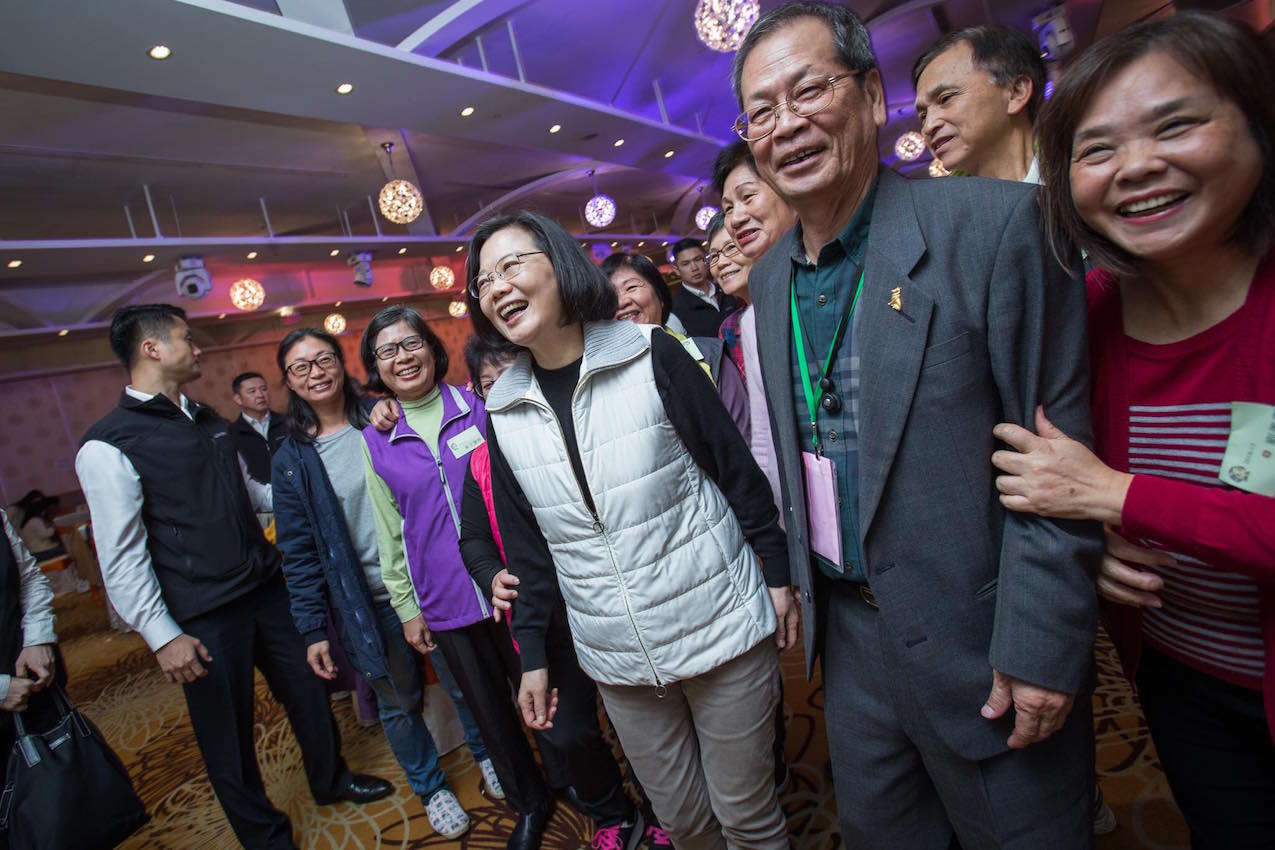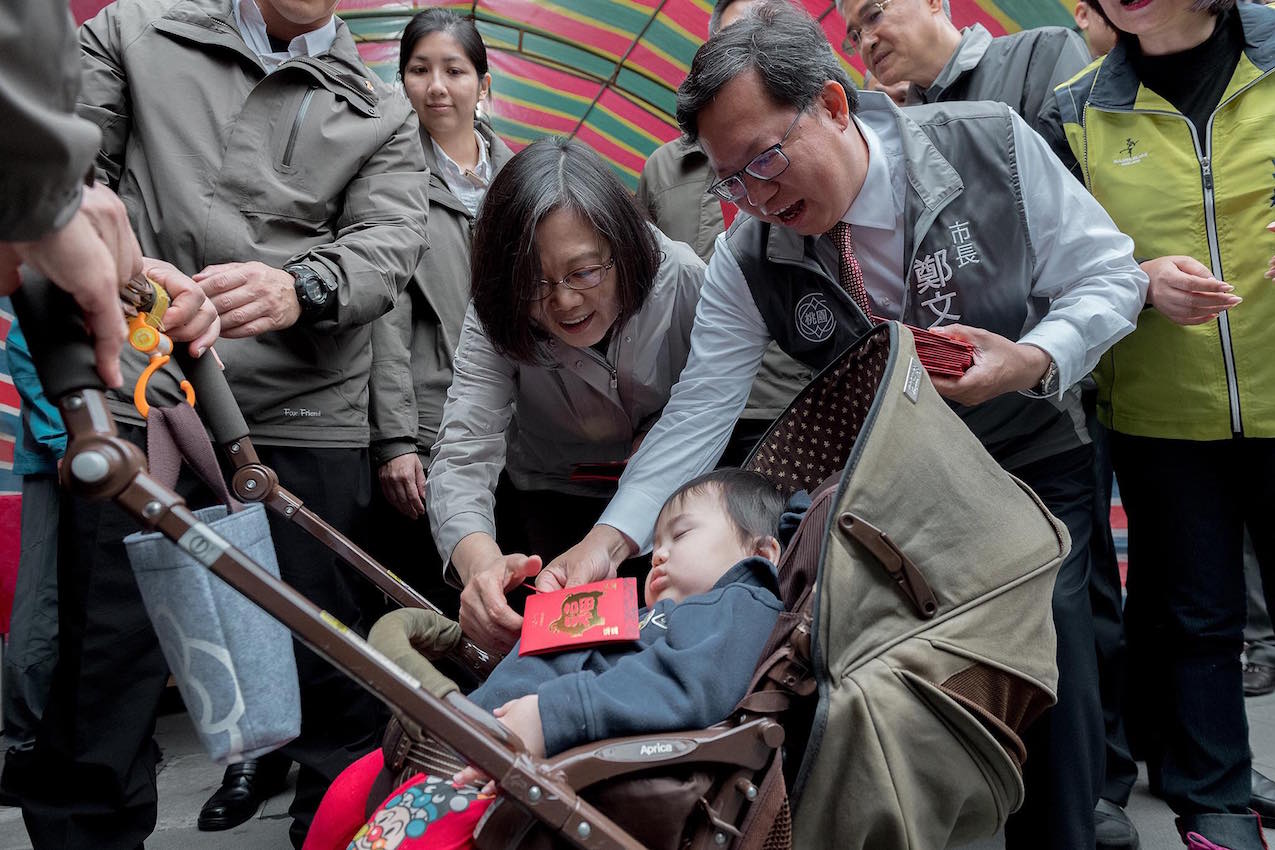by Brian Hioe
語言:
English
Photo Credit: Tsai Ing-wen/Facebook
TSAI ING-WEN announced that she would be seeking reelection last week on an interview with CNN Beijing correspondent Matt Rivers. The interview took the form of two eight-minute videos, featuring a formal one-on-one interview between Rivers and Tsai in which Tsai responded to questions in Mandarin, as well as more informal segments featuring Tsai traveling on a plane, conducting meetings, and taking Rivers to visit restaurants and shops, during which Tsai responded to questions in English.
Tsai’s announcement that she would be seeking reelection was a surprising casual mention that she sought to “complete her vision” as president during the segment featuring Rivers and Tsai on an airplane. This was interpreted by international media and domestic Taiwanese media as Tsai announcing that she was seeking reelection.
 Tsai Ing-wen (center). Photo credit: Tsai Ing-wen/Facebook
Tsai Ing-wen (center). Photo credit: Tsai Ing-wen/Facebook
It does not surprise that Tsai would seek reelection. Earlier this year, Tsai was called on not to run by a number of DPP elders including former presidential candidate and DPP chair Peng Ming-min, former Academia Sinica president Lee Yuan-tseh, Presidential Office adviser Wu Li-pei, and the recently deceased Reverend Kao Chun-ming. It was generally thought that these DPP elders, who were among those that formed the Formosa Alliance to organize a referendum on what name Taiwan should participate in the 2020 Tokyo Olympics under in the hopes of eventually pushing for a referendum on Taiwanese independence, did not see Tsai as being proactive enough on the issue of independence.
Nevertheless, this challenge against Tsai by these DPP elders largely ran aground after the public rallied behind Tsai following a speech on January 2nd by Chinese president Xi Jinping in which Xi vowed the continued use of force against Taiwan if Taiwan did not unify with China. The public responded supportively to Tsai taking a firm line against Xi.
Indeed, Tsai’s efforts to improve her outreach with the public have been particularly visible in after the DPP’s defeats in nine-in-one elections last November, with Tsai’s adoption of new social media outreach strategies including writing statements about her personal life on social media, frequently posting infographics and animations, starting a public Line account, and accepting interviews about her pets. Accepting the CNN interview and being willing to discuss her personal life to a surprisingly large extent was likely also part of her charm offensive.
Yet it is to be questioned why Tsai chose CNN specifically as a venue for the announcement. For one, CNN is held in unusually high regard in Taiwan, as though it were the world’s flagship international television channel. It is also possible that Tsai realized that many members of the public see Tsai as stronger on international issues, such as in taking a strong stance against China while at the same time not excessively provoking China, than on domestic issues, such as regarding labor law changes, pension reforms, and gay marriage. Although the report did discuss Tsai’s flagging approval ratings and the challenges of facing a revitalized KMT, this has not been widely seen in Taiwan as a negative assessment on Tsai from international media.
In the meantime, much remains uncertain regarding how China will respond to Tsai seeking reelection. It is highly likely that China will attempt some means of election interference, including possible attempts to prop up the popularity of KMT candidates and attack Tsai through social media-based disinformation campaigns.
 Photo credit: Tsai Ing-wen/Facebook
Photo credit: Tsai Ing-wen/Facebook
Likewise, attempts to attack Tsai have already begun from pan-Blue media. One can already see what form such attacks will take. A newspaper headline about Tsai announcing her reelection by the China Times has been widely mocked, for example, because it began with the statement that Tsai was running “in spite of opposition from Beijing” (不顧北京反對). It is an obvious fact that China’s wishes have little direct impact on Tsai’s decision to run or not, hence widespread mockery of the headline in Taiwan, leading many to post on social media about them going about regular daily actions such as eating dinner, or exercising, or going to work, “in spite of opposition from Beijing”. Ironically, this is in fact quite often how international media reports on events in Taiwan.
It is still to be seen as to what Tsai will make the key issues of her 2020 campaign, however. While it remains unclear as to who Tsai’s KMT challenger will be, even if Tsai realizes that she needs to step up public outreach in order to win reelection, Tsai will certainly also need to campaign on the basis of a platform that is able to win back the public. But Tsai has to date been less than specific about her planned platform.

